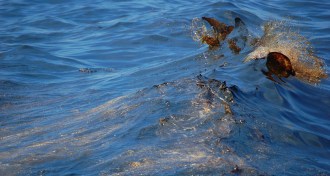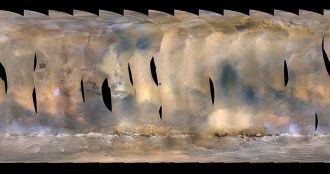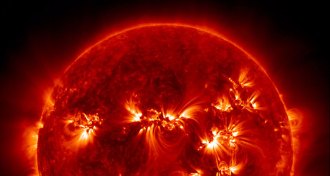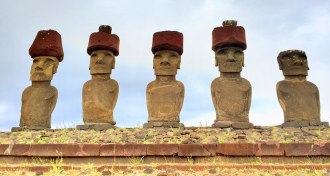All Stories
-
 Physics
PhysicsThis heavy element has a football-shaped atomic nucleus
Three nobelium isotopes have oblong nuclei, and some sport a ‘bubble’ center.
-
 Physics
PhysicsIn her short life, mathematician Emmy Noether changed the face of physics
A century after she published a groundbreaking mathematical theory, Emmy Noether gets her due.
-
 Science & Society
Science & SocietySo what do you know about Emmy Noether?
Editor in Chief Nancy Shute discusses physicist Emmy Noether and women being underrepresented in science fields.
By Nancy Shute -
 Environment
EnvironmentSunshine is making Deepwater Horizon oil stick around
Sunlight created oxygen-rich oil by-products that are still hanging around eight years after the Deepwater Horizon spill.
-
 Astronomy
AstronomyReaders were curious about pendulum saws, laser tweezers and more
Readers had questions about Bronze Age pendulum saws, dark matter, lazer tweezers and more.
-
 Planetary Science
Planetary ScienceOpportunity rover waits out a huge dust storm on Mars
NASA’s Opportunity rover is in low-power mode to preserve battery life while a vast dust storm blankets part of the Red Planet.
-
 Artificial Intelligence
Artificial IntelligenceA new AI can focus on one voice in a crowd
The artificial intelligence can ignore background noise in videos and focus on what a particular person is saying.
-
 Astronomy
AstronomyThe sun shrinks a teensy bit when it’s feeling active
The radius of the sun gets slightly smaller during periods of high solar activity, researchers say.
-
 Health & Medicine
Health & MedicineKids with food allergies are twice as likely to have autism
Children with food allergies are more likely to have autism than kids without, a study finds. But that doesn’t mean a child will develop the disorder.
-
 Health & Medicine
Health & MedicineIf you thought the most recent flu season was bad, you were right
The recent U.S. flu season was classified as highly severe overall, the third time since 2003 that the seasonal outbreak has earned that designation.
-
 Archaeology
ArchaeologyThis theory suggests few workers were needed to cap Easter Island statues
A small workforce may have put huge stones on the heads of Easter Island statues.
By Bruce Bower -
 Health & Medicine
Health & MedicineSuicide rates have shot up in almost every U.S. state
Suicide rates increased sharply in nearly all 50 states from 1999 to 2016, according to a new government report.